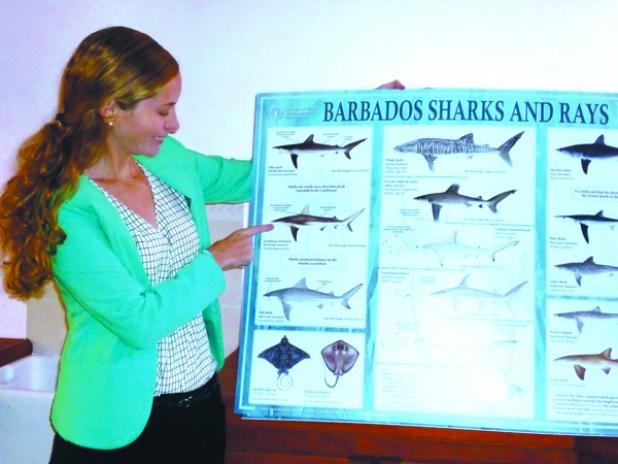
Nikola Simpson, Marine Biologist and Fisheries Consultant at Food and Agriculture Organisation (FAO) of the United Nations in Barbados, showing the poster of ‘Barbados Sharks and Rays’, which will be distributed to schools as part of an education and outreach plan.
Swimmers ‘safe’
Mon, 04/18/2016 - 12:00am
There are about 19 species of sharks in Barbados waters, however the average individual will not encounter them where they usually swim.
Based on data obtained from a preliminary assessment on shark and manta ray resources, Marine Biologist and Fisheries Consultant at Food and Agriculture Organisation (FAO) of the United Nations in Barbados, Nikola Simpson, recently reported that there is both a small directed fishery for sharks in Barbados as well as numerous shark interactions in the pelagic longline fishery as ‘incidental catch’, of which most of the meat and liver oil is either used or sold, while the fins and head are often discarded.
She revealed that the most common species landed by the island’s longline fleet and available in markets, primarily the Bridgetown Fish Complex were – the Shortfin mako (lion), the Oceanic whitetip (all-fin), and the Blue (peter) sharks.
“It must be noted that these species are caught up to 200 miles offshore,” she stressed, also pointing out that the most common species sighted by divers mainly on the East Coast of the island were the: southern stingray (skate), the spotted eagle (leopard) ray, the nurse (ground) shark and the Caribbean reef shark (smooth skin shark).
“Many individuals enjoy eating the meat of sharks, which sells at $3 to $5 BBD/pound, but should avoid regular consumption of these species due to their drastic pop-ulation decline and the potential for harmful toxins in their meat,” she cautioned.
Speaking to The Barbados Advocate on the sidelines of the validation workshop hosted by the FAO for the development of a National Plan of Action for the Conservation and Management of Sharks (NPOA – Sharks), she explained that sharks play an important role in maintaining balance in marine ecosystems.
She said that aside from contributing to the ecological sustainability of marine life, shark species also contribute to social and economic sustainability.
“However, due to their life-history characteristics, such as late age of maturity and production of few offspring, many species are vulnerable to the pressures of overfishing and have experienced rapid population decline,” it was further explained.
(TL)
